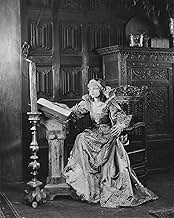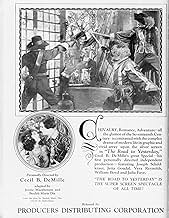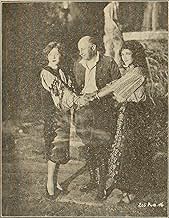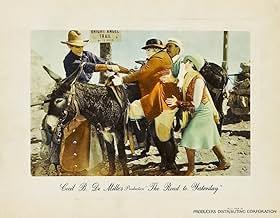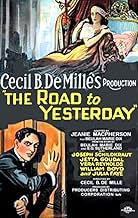A married couple discovers that their strained relationship is the result of unhappiness in their past lives.A married couple discovers that their strained relationship is the result of unhappiness in their past lives.A married couple discovers that their strained relationship is the result of unhappiness in their past lives.
Wilson Benge
- Kenneth's Butler
- (uncredited)
Robert Brower
- Elderly Party Guest
- (uncredited)
Charles Clary
- Doctor
- (uncredited)
Iron Eyes Cody
- Indian
- (uncredited)
Frank Coghlan Jr.
- Boy Scout
- (uncredited)
Walter Long
- Rowdy in Burning-at-the-Stake Scene
- (uncredited)
Chester Morris
- Party Guest
- (uncredited)
Sally Rand
- Party Guest
- (uncredited)
Storyline
Did you know
- TriviaThe production team was housed at the El Tovar Hotel at the Grand Canyon while working on location for this film.
- ConnectionsFeatured in Boom! Hollywood's Greatest Disaster Movies (2000)
Featured review
Joseph Schildkraut as (Kenneth "Ken" Paulton) and Jetta Goudal (as Malena Paulton) are honeymooning at the Grand Canyon; but, Ms. Goudal is uninterested in consummating the marriage. This, understandably, frustrates Mr. Schildkraut, who can't explain a worsening pain in his arm. They are acquainted with the William Boyd (as John "Jack" Moreland), a minister, who suggests Schildkraut ask God for relief from the hurt in his arm. Schildkraut prays for three weeks, to no avail. Meanwhile, the Reverend Boyd has met and fallen in love with Vera Reynolds (as Elizabeth "Bess" Walsingham Tyrell), a "very modern young lady" who cools off when she finds out he is a minister. These four players act out their modern problems for about half the film; THEN, fate arranges for them all to be on a train, bound for San Francisco - THEN, the train spectacularly crashes, head-on, into another train!
As the passengers whirl in the train wreckage, Reynolds is mysteriously transported back to 16th Century England. There, she finds faces which are familiar to her, but their personalities are slightly different - these are the "past lives" of her modern day friends and acquaintances. Reynolds assumes the identity of "Lady Elizabeth Tyrell". Joseph Schildkraut is "Lord Strangevon", William Boyd is "Reformado Jack", and Jetta Goudal is "Black Melena". By the time of the flashback, the film has shifted to feature Vera Reynolds as the star and protagonist; earlier, "The Road to Yesterday" was a drama centering on the Paulton newlyweds. During the trip to the past, Reynolds (and viewers) discover the origins of mysterious stuff from the present. You'll see some startling events, culminating with a character being burned as a witch!
This is a very unusual film. The only story structure like it (that I've seen) is "Dark Shadows" TV flashback of 1967, detailing Barnabas Collins' 1700s origin. There is no vampire in "The Road to Yesterday", but Schildkraut's rape of Goudal looks about the same (attacked in a darkened room ). Cecil B. DeMille directs some fine performances; strangely, Reynolds and Boyd outdistance Schildkraut and Goudal as the film progresses.
Boyd would later star as "Hopalong Cassidy". I also enjoyed Reynolds' less reverend fiancée, Casson Ferguson as "Adrian Thompkyns"; and, Trixie Friganza as "Aunt Harriet," who appears as a similar character in the past. Also, Frank Coghlan Jr. is memorable the freckle-faced boy; he was a very popular child star, and played "Billy Batson" (Captain Marvel) during an incredibly long career.
More potential is lost than realized in this intriguingly original film, from an older Beulah Marie Dix story - it's disappointing, ultimately, but a fascinating watch - nicely photographed by J. Peverell Marley. With some more work, it might have been one of the better DeMilles (see "The Cheat" and "The Whispering Chorus" for great DeMilles). Note: After the witch is burned at the stake, a fleeting title card flashes - I freeze-framed to see, and it reads, "The Road to Yesterday - End of Part 9"; probably, signaling the End of Reel 9. Also note, in the past, Reynolds character reveals she is from 1926; the film was released at the end of 1925, but DeMille expected most would be watching in 1926.
******* The Road to Yesterday (11/15/25) Cecil B. DeMille ~ Joseph Schildkraut, William Boyd, Vera Reynolds, Jetta Goudal
As the passengers whirl in the train wreckage, Reynolds is mysteriously transported back to 16th Century England. There, she finds faces which are familiar to her, but their personalities are slightly different - these are the "past lives" of her modern day friends and acquaintances. Reynolds assumes the identity of "Lady Elizabeth Tyrell". Joseph Schildkraut is "Lord Strangevon", William Boyd is "Reformado Jack", and Jetta Goudal is "Black Melena". By the time of the flashback, the film has shifted to feature Vera Reynolds as the star and protagonist; earlier, "The Road to Yesterday" was a drama centering on the Paulton newlyweds. During the trip to the past, Reynolds (and viewers) discover the origins of mysterious stuff from the present. You'll see some startling events, culminating with a character being burned as a witch!
This is a very unusual film. The only story structure like it (that I've seen) is "Dark Shadows" TV flashback of 1967, detailing Barnabas Collins' 1700s origin. There is no vampire in "The Road to Yesterday", but Schildkraut's rape of Goudal looks about the same (attacked in a darkened room ). Cecil B. DeMille directs some fine performances; strangely, Reynolds and Boyd outdistance Schildkraut and Goudal as the film progresses.
Boyd would later star as "Hopalong Cassidy". I also enjoyed Reynolds' less reverend fiancée, Casson Ferguson as "Adrian Thompkyns"; and, Trixie Friganza as "Aunt Harriet," who appears as a similar character in the past. Also, Frank Coghlan Jr. is memorable the freckle-faced boy; he was a very popular child star, and played "Billy Batson" (Captain Marvel) during an incredibly long career.
More potential is lost than realized in this intriguingly original film, from an older Beulah Marie Dix story - it's disappointing, ultimately, but a fascinating watch - nicely photographed by J. Peverell Marley. With some more work, it might have been one of the better DeMilles (see "The Cheat" and "The Whispering Chorus" for great DeMilles). Note: After the witch is burned at the stake, a fleeting title card flashes - I freeze-framed to see, and it reads, "The Road to Yesterday - End of Part 9"; probably, signaling the End of Reel 9. Also note, in the past, Reynolds character reveals she is from 1926; the film was released at the end of 1925, but DeMille expected most would be watching in 1926.
******* The Road to Yesterday (11/15/25) Cecil B. DeMille ~ Joseph Schildkraut, William Boyd, Vera Reynolds, Jetta Goudal
- wes-connors
- Oct 10, 2007
- Permalink
Details
Box office
- Budget
- $477,480 (estimated)
- Runtime1 hour 47 minutes
- Color
- Sound mix
- Aspect ratio
- 1.33 : 1
Contribute to this page
Suggest an edit or add missing content

Top Gap
By what name was The Road to Yesterday (1925) officially released in Canada in English?
Answer
